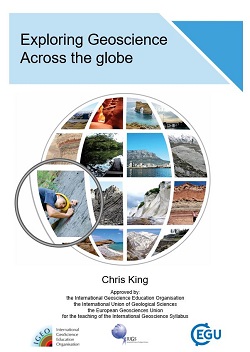 Chris King, Emeritus Professor of Earth Science Education, Keele University, has written this excellent Open Access book Exploring Geoscience Across the Globe. It has been prepared to support the teaching of the International Geoscience Syllabus (IGS) (itself reproduced in an Appendix).
Chris King, Emeritus Professor of Earth Science Education, Keele University, has written this excellent Open Access book Exploring Geoscience Across the Globe. It has been prepared to support the teaching of the International Geoscience Syllabus (IGS) (itself reproduced in an Appendix).
Readers of 'Geoscientist' know that geoscience is the scientific study of our planet, or nowadays the whole solar system. Geoscientists therefore investigate the Earth from atomic to global scales using elements of geology, biology, chemistry, physics, maths, geography, HSE, economics and engineering. We cover sub-topics - amongst others, geochemistry, geophysics, palaeontology, hydrogeology and engineering geology to study meteorology, oceanography, soil science, aspects of the solar system, mineral exploitation, environmental science and much more. This huge range of activities covering natural phenomena, important professional wealth-earning industries and environmental concerns is introduced in this book.
King moves in simple jargon-free language through the geoscience background theory to application. He discusses the geosphere, atmosphere, hydrosphere and biosphere, and indicates many beneficial applications but also some of the negatives, such as pollution, including industrial mining-waste poisoning, oil pollution from tankers, plastic debris going into food chains and climate change. The topics are covered in some 7 chapters, starting with the basics of the water, rock and carbon cycles and energy sources, including renewables and geothermal, and moving onto the systems of the Earth, explaining seasons and eclipses and geological time scales. The formation of metamorphic, igneous and sedimentary rocks, the effects of tectonic plates and the fascination of fossils follow, then details of the Earth's internal structure, the hydrosphere, including oceans, and the layers of the atmosphere. Next come raw materials within Earth, the plusses and minuses of mineral exploration and exploitation such as mining and energy from fossil fuels. Natural hazards of earthquakes, volcanoes, tsunamis and landslides lead on to the problems created by humans, particularly some background to climate change.
King presents all apolitically - just the facts. His text is beautifully illustrated with many examples presented clearly in tables, photographs and ‘interest boxes’. A separate ‘Activity Supplement’ provides teaching activities and questions to test knowledge and understanding. This resource for supporting educators across the world in teaching the IGS is superb.
Open Access books permit a 'free' read via http://www.igeoscied.org/teaching-resources/geoscience-text-books/ then 'Exploring-Geoscience-across-the-globe'. So if you are a new Earth science/geology/geoscience student, an environmentalist (or protester), or are looking for a good grounding of sound knowledge on 'green issues' you should download and digest this book. I shall be recommending this excellent introduction to my students, and, naturally, any 'extinction rebellionist' needing proper unbiased background.
Reviewed by Richard Dawe
EXPLORING GEOSCIENCE ACROSS THE GLOBE by Chris King, 2019. Published by International Geoscience Education Organisation, IGEO. Available as pdf. 238pp. ISBN: 978-1-9996264-0-2 cost - free via internet, http://www.igeoscied.org/teaching-resources/geoscience-text-books/ then go to 'Exploring-Geoscience-across-the-globe'.